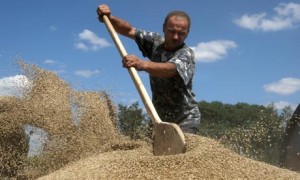
Guardian Weekly | Tuesday 20 July 2010 | français
The black earth of Ukraine has the potential to triple the country's exports of grain if investors are willing to take the risk
Laetitia Van Eeckhout
In a few years' time Ukraine could regain its position as a global breadbasket, realising the huge agricultural potential of its famous chernozem (black earth), one of the most fertile soils in the world. Agriculture is one of the prime assets of this former Soviet republic, much as in Russia and Kazakhstan, with which it forms an eastern corn belt. Farming is all the more important as Ukraine lacks its neighbours' gas and mineral resources.
Ukraine is already the world's top producer of barley, ranking second for sunflower and rapeseed. It produces about 50m tonnes of grain, just under half of which is exported. "But over the next 10 to 15 years the country aims to triple its export capacity, to become one of the major suppliers, perhaps even the top supplier, for the main importing countries around the Mediterranean," says Jean-Jacques Hervé, a former adviser to the Ukrainian ministry of agriculture. Now he is at Index Bank, the local subsidiary of France's Crédit Agricole. "This country has the potential to produce 100m tonnes."
Ukraine is far from making the most of its assets. A third of its 42m hectares of arable land lies fallow and another third is badly exploited. Privatisation of land ownership started in 1992, allocating two- to five-hectare units to former collective-farm workers. To prevent further splintering of property it was subsequently decided to place a ban on the sale of farmland. Many Ukrainians now prefer to lease their land rather than working it themselves.
Some of them have joined forces to form small farms but they lack the resources to develop, particularly as it is difficult to obtain credit, as the banks have yet to recover from the financial crunch. Of the 50,000 or so existing farms, only about 8,500 have the means to modernise production and compete on the open market. Most of them cover at least 500 hectares and are operated by Ukrainian farming companies or foreign investors, mainly from Scandinavia and the English-speaking world.
Foreign investors who moved here in 2006-07 when world grain prices rocketed must now rethink their strategy. Landkom International, based in the Isle of Man, started operations in western Ukraine in 2007 but reported losses of $56m the following year, illustrating the limitations of a strictly speculative approach.
The country is nevertheless still attractive to investors. A French holding company, Agro Generation, owned by entrepreneur Charles Beigbeder, operates six farms, covering more than 45,000 hectares and producing 150,000 tonnes of wheat, barley, maize, rape- and sunflower seed, a third of which is sold locally. By the end of 2012, Beigbeder plans to more than double the area of land under cultivation.
The initial investment for every hectare of land taken in hand – some having been fallow for years – is $850. But modernisation of the farms and new production methods have brought genuine progress. "We are getting yields of 40 quintals [400kg] a hectare and we hope to achieve 53 quintals very soon," says Charles Vilgrain, one of the original founders of Agro Generation, which employs 350 permanent staff. "That is certainly half the yield we see in the Beauce [France's breadbasket], but our production costs are substantially lower." The company is currently registering 15% to 20% profits on each of its farms, without any subsidies.
Agribusinesses in Ukraine do not pay corporation tax and enjoy a low VAT rate. "Even without these benefits we would still have a healthy profit margin," says Alexandre Joseph, Agro Generation's financial manager. "We are operating a low-cost model, with significant economies of scale due to the size of the farms."
This article originally appeared in Le Monde










